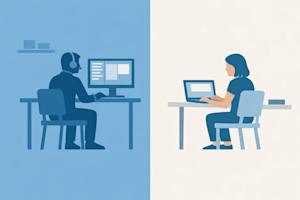The COVID-19 pandemic accelerated a growing trend of remote and flexible work, causing IT teams to rethink how they provide access to critical business systems. In addition, many schools and universities quickly scrambled to develop distance learning capabilities to ensure continuity for their students.
In this blog, we discuss the increasing demand for remote user software and how organizations can adjust in the new age of flexible work/learning. We’ve also broken down a few common use cases.
Remote user software for businesses
Flexible work is here to stay. And IT teams are facilitating flexible work with remote user software which enables employees to access their computers and applications remotely.
There are two main reasons why employees may need to remotely access on-site computers:
The applications needed for their jobs are either too large to run on their home computers or are too expensive to purchase individual licenses for.
They require higher levels of security because they work in an industry like finance, healthcare, or government. Therefore, it isn’t possible, or secure to have important files and applications on remote employees’ individual devices.
Enable distance learning for remote users
There are 3 main elements to enabling remote learning.
Give students remote access to lab computers so they can still use important applications. (This is especially important for engineering and art students who often use extremely resource-intensive programs).
Give faculty and staff access to their work computers so they can continue instructing and providing guidance to their students from home.
Ensure that IT can quickly access and provide remote support to any student or faculty member on any device (including computers, tablets, and smartphones).
Questions to consider when evaluating remote user software and technology
When deciding on a remote user system for your organization, it’s important to ask yourself these questions:
Can a VPN sufficiently handle the amount of traffic my remote users will generate?
What level of security do I need to ensure to maintain compliance with relevant industry and state/federal laws and regulations?
Which operating systems do I need to provide support and access to?
Is this platform simple and intuitive enough for my end users?
Do I need to deploy this solution in the cloud, on-premises, or both?
What is my budget for this project and how will that compare to a VPN or other remote user technology platform?
How Splashtop can enable remote work and learning
Splashtop gives users secure remote access to any device, anywhere – solving all the remote user needs of businesses, IT, and education. Remote and hybrid workers can access their desktops from anywhere. IT can remotely support any managed or personal device. Students and staff can access on-campus computing resources.
When COVID-19 hit, BDP architecture had a major problem: the software their architects used to design buildings and infrastructure did not perform well with multiple connected users. The resulting low performance and high latency made it impossible to keep projects moving forward. Within 48 hours, Splashtop allowed BDP employees to remotely access their work machines as if they were sitting in front of them, bypassing the need to install any software.
Similarly, Imperial Valley College faced a huge challenge when COVID-19 shut down their campus. While faculty and staff were able to take home their laptops, IT couldn’t provide support because they were no longer able to access them in person. With Splashtop, they were able to perform remote troubleshooting and simplify to just one person answering phones and doing quick fixes.
Learn more about how your organization can transition to flexible work or learning with Splashtop’s solutions for hybrid work. Start a free trial of Splashtop today to see how you can elevate your organization’s remote work experience.
Or, check out all Splashtop remote access products, including solutions for IT support, education, and enterprises.




